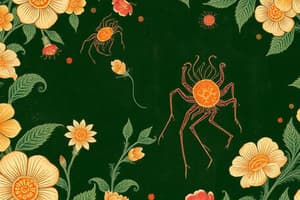Podcast
Questions and Answers
What is a key characteristic of solitary wasps?
What is a key characteristic of solitary wasps?
- They feed on materials of plant and animal origin (correct)
- They have a queen that lays eggs
- They live in colonies
- They construct elaborate nests
How do larvae of solitary wasps develop?
How do larvae of solitary wasps develop?
- By constructing nests
- By being fed on materials of plant and animal origin (correct)
- By feeding on other larvae
- By pupating directly from eggs
What is the role of adult male wasps in the ecosystem?
What is the role of adult male wasps in the ecosystem?
- Defend the nest against predators
- Act as efficient pollinators
- Feed on nectar and pollen (correct)
- Build nests for the colony
How do some wasps affect humans?
How do some wasps affect humans?
Which of the following is NOT a type of solitary wasp mentioned in the text?
Which of the following is NOT a type of solitary wasp mentioned in the text?
What happens to male wasp workers in winter?
What happens to male wasp workers in winter?
What behavior can be expected from worker wasps if their nest is disturbed?
What behavior can be expected from worker wasps if their nest is disturbed?
In a paper wasp colony, which female usually becomes the dominant queen?
In a paper wasp colony, which female usually becomes the dominant queen?
How are the nests of paper wasps typically suspended?
How are the nests of paper wasps typically suspended?
What building materials do paper wasps use to construct their nests?
What building materials do paper wasps use to construct their nests?
What do paper wasps feed their young larvae?
What do paper wasps feed their young larvae?
Which type of wasps are considered to be solitary?
Which type of wasps are considered to be solitary?
What distinguishes social wasps from solitary wasps?
What distinguishes social wasps from solitary wasps?
How do yellow jackets and hornets start a colony?
How do yellow jackets and hornets start a colony?
What do larvae do after being fed by the queen for about two weeks?
What do larvae do after being fed by the queen for about two weeks?
Where do most yellow jackets build their nests?
Where do most yellow jackets build their nests?
What is the main diet of yellow jackets and hornets?
What is the main diet of yellow jackets and hornets?
How do the larvae of yellow jackets and hornets transform into adult workers?
How do the larvae of yellow jackets and hornets transform into adult workers?
Flashcards are hidden until you start studying



